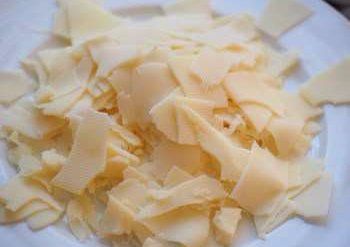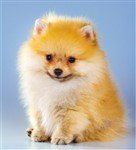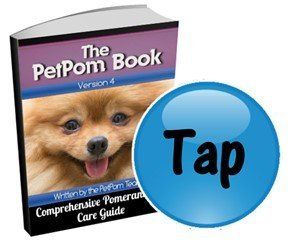Can a Pomeranian Eat Cheese?
You are here:
Pomeranian Information
- Feeding
- Can a Pomeranian Puppy or Dog Safely Eat Cheese?
Whether you are feeding your Pom a high quality manufactured dog food or are carefully creating homemade meals for your little ball of fluff, there will be plenty of times when you have a certain food ingredient that you've just prepared for yourself and are wondering, "Can my Pomeranian safely eat this?"
We receive lots of emails asking us about specific foods and we have decided to round them all up and list the most popular questions in regard to what a Pomeranian can eat. You may be a bit surprised by the answers!
Since the Pom is such a tiny toy breed dog, he cannot eat some of the foods that a medium or large sized dog can eat - if so, stomach upset could occur. Also, there are some foods that you would never think to feed your Pomeranian as a treat or as an addition to a meal, however they are actually healthy for canines and a good way to provide extra nutrition. So, let's take a look. Afterward, you may just need to add a few things to your shopping list!

Can my Pomeranian Eat Cheese?
This is a common question; it seems that the vast majority of Pom owners are cheese lovers! This food has been around for such a long time, that when we researched the origin of cheese, it actually predates recorded history! It seems that every year, someone thinks of a new way to add this to a food to enhance it. Think 'cheese fries'.
Most of us automatically know that it is derived from milk and contains calcium. Canines need calcium, so would it be healthy for a Pomeranian to have a nibble of cheese?
Let's look at what else is commonly found in cheese. Most of the cheese that you will find in the supermarket today comes from the milk of cows. Less common, but certainly still important to note is cheese that comes from the milk of sheep, buffalo and goats.
There are countless types of cheese, therefore additional ingredients will vary. Some contain herbs, spices, wood smoke (this is the process of exposing a food to smoke to add flavor), black peppers, garlic, chives and even cranberries, which are used to add flavor. Some cheeses that are red in color have annatto in them. Many cheeses are curdled; which means that acids including vinegar and lemon juice are used or bacteria is used to acidify the cheese, which works by turning milk sugars into lactic acid.
While there are many different varieties, most cheese is high in fat, calcium, protein and phosphorus. Cheddar cheese (and other types) also has a good amount of Vitamin A. Just about everyone knows that calcium is needed for strong bones, however it is also important in other ways: It helps heart function, supports nerve transmission, aids in muscle building and plays a role in hormone secretion.
Now that we know more about the cheese that we eat, can a Pomeranian eat cheese?
If you were to do a search on this, you would find all sorts of wild, unfounded opinions. So, we're going to keep it simple and truthful, since the health and happiness of Pomeranians is our top priority.
Dogs can eat cheese in moderation, IF an owner is careful about a couple of things. It is not considered to be toxic to dogs and a bit of certain cheese can be a great addition to meals, however let's look at some important elements:
1)
As with just about all food ingredients, moderation is the key. If cheese is to be fed, a small piece can be given as a snack
or as a reward for listening to commands or for other training that you may be doing.
Eating a high amount can cause constipation. A serving for a Pomeranian will be 1/4 to 1/2 ounce. There is a simple way of quickly figuring out how much a 1/2 ounce of 1/4 ounce is…
1/2 ounce of cheese will be just about 1/2 the size of your thumb and of course, 1/4 will be half of that.
2)
Just as with humans, there are some dogs that are lactose intolerant.
This is essentially an inability to digest milk and milk products due to the body not being able to absorb and digest the lactose (meaning the sugar in the milk products). If you decide to treat your Pomeranian to a small bit of cheese, carefully watch to see if there are any adverse reactions (upset stomach, bloating, rumbling sounds coming from the belly, diarrhea or loose stools, and/or throwing up).
Remember that only a small percentage of canines are lactose intolerant, and it is a good idea to know if your Pomeranian is or is not one of them. While only a small minority of Pomeranians will be lactose intolerant, you will then know to not feed other products to your Pom such as milk, yogurt and doggie ice cream. Additionally, you may be surprised to know that some other foods contain lactose such as some breads and some cereals.
3)
Stay away from spiced cheese and stick to plain options instead such as American or cheddar. (a bit of shredded cheese sprinkled over a meal can make it go from 'so-so' to 'yummy!')
4)
Cottage cheese is actually a very healthy food that can be fed to Pomeranian of all ages. Many owners have found that a small serving of cottage cheese works well as a soft "easy on the stomach" food for Pomeranians that have an stomach upset. In addition, growing puppies can benefit from a small, daily serving of cottage cheese.
5)
A small piece of cheese can be a great 'pill delivery system'. Using soft cheese and curling medication into it seems to work well for dogs that need to swallow medicine that is in pill form.
6) Cream cheese can also be fed to a Pomeranian, but again, in moderation. Most simply love this. For a special treat (maybe your Pomeranian mastered heeling and you want to celebrate!), you can spread a bit on a doggie biscuit.
7) Remember that just because cheese is a component of a food does not mean that it is okay for a Pomeranian to eat that food. An example of this is pizza. While someone may think that a slice of cheese pizza is "only" bread, sauce and cheese, many sauces contain onions which is toxic to dogs.
8) If your Pomeranian is fine with milk based products, it is healthy to allow your Pom to eat cheese. If given on a daily basis, opt for a low-fat variety.
Points to remember
Whether you feed your Pomeranian commercial food or you make your Pom home cooked meals, NEVER give your Pom food from your plate. If you do this, you will be setting up the foundation for begging behavior. As with any snack or treat, your Pom must be fed either at meal time, as part of a scheduled snack or as a reward.
If you want to experiment with giving your Pom a small piece of cheese, do this at specific times. It can be a great treat for a Pomeranian that is being trained- whether that be for commands, socialization or house training. If your Pomeranian is already trained, do remember that giving rewards from time to time is an important method of reminding them that they are doing a good job and it reinforces lessons that have been learned.


